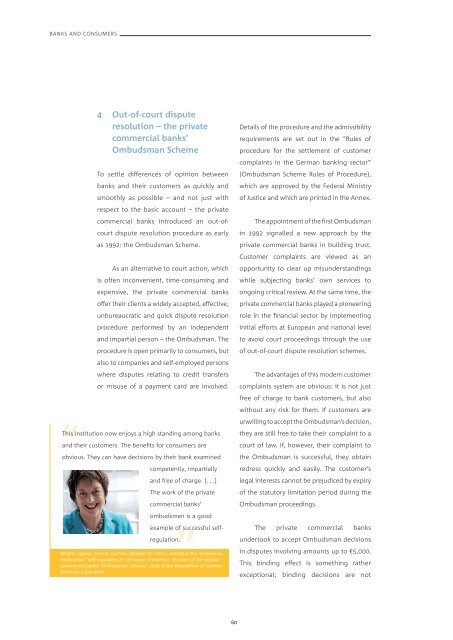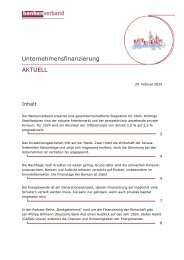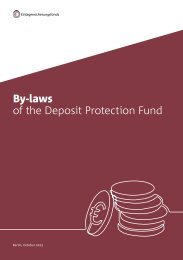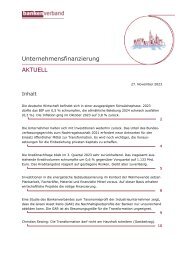Banks and Consumers
The Comprehensive Consumer Policy Scheme of the German Private Commercial Banks
The Comprehensive Consumer Policy Scheme of the German Private Commercial Banks
Create successful ePaper yourself
Turn your PDF publications into a flip-book with our unique Google optimized e-Paper software.
BANKS AND CONSUMERS<br />
4 Out-of-court dispute<br />
resolution – the private<br />
commercial banks’<br />
Ombudsman Scheme<br />
To settle differences of opinion between<br />
banks <strong>and</strong> their customers as quickly <strong>and</strong><br />
smoothly as possible – <strong>and</strong> not just with<br />
respect to the basic account – the private<br />
commercial banks introduced an out-ofcourt<br />
dispute resolution procedure as early<br />
as 1992: the Ombudsman Scheme.<br />
As an alternative to court action, which<br />
is often inconvenient, time-consuming <strong>and</strong><br />
expensive, the private commercial banks<br />
offer their clients a widely accepted, effective,<br />
unbureaucratic <strong>and</strong> quick dispute resolution<br />
procedure performed by an independent<br />
<strong>and</strong> impartial person – the Ombudsman. The<br />
procedure is open primarily to consumers, but<br />
also to companies <strong>and</strong> self-employed persons<br />
where disputes relating to credit transfers<br />
or misuse of a payment card are involved.<br />
This institution now enjoys a high st<strong>and</strong>ing among banks<br />
<strong>and</strong> their customers. The benefits for consumers are<br />
obvious. They can have decisions by their bank examined<br />
competently, impartially<br />
<strong>and</strong> free of charge. [. . .]<br />
The work of the private<br />
commercial banks’<br />
ombudsmen is a good<br />
example of successful selfregulation.<br />
Brigitte Zypries, former German Minister of Justice, talking at the anniversary<br />
celebration “Self-regulation in consumer protection: 15 years of the private<br />
commercial banks’ Ombudsman Scheme”, held at the Association of German<br />
<strong>Banks</strong> on 5 July 2007.<br />
Details of the procedure <strong>and</strong> the admissibility<br />
requirements are set out in the “Rules of<br />
procedure for the settlement of customer<br />
complaints in the German banking sector”<br />
(Ombudsman Scheme Rules of Procedure),<br />
which are approved by the Federal Ministry<br />
of Justice <strong>and</strong> which are printed in the Annex.<br />
The appointment of the first Ombudsman<br />
in 1992 signalled a new approach by the<br />
private commercial banks in building trust.<br />
Customer complaints are viewed as an<br />
opportunity to clear up misunderst<strong>and</strong>ings<br />
while subjecting banks’ own services to<br />
ongoing critical review. At the same time, the<br />
private commercial banks played a pioneering<br />
role in the financial sector by implementing<br />
initial efforts at European <strong>and</strong> national level<br />
to avoid court proceedings through the use<br />
of out-of-court dispute resolution schemes.<br />
The advantages of this modern customer<br />
complaints system are obvious: it is not just<br />
free of charge to bank customers, but also<br />
without any risk for them. If customers are<br />
unwilling to accept the Ombudsman’s decision,<br />
they are still free to take their complaint to a<br />
court of law. If, however, their complaint to<br />
the Ombudsman is successful, they obtain<br />
redress quickly <strong>and</strong> easily. The customer’s<br />
legal interests cannot be prejudiced by expiry<br />
of the statutory limitation period during the<br />
Ombudsman proceedings.<br />
The private commercial banks<br />
undertook to accept Ombudsman decisions<br />
in disputes involving amounts up to €5,000.<br />
This binding effect is something rather<br />
exceptional; binding decisions are not<br />
60


















